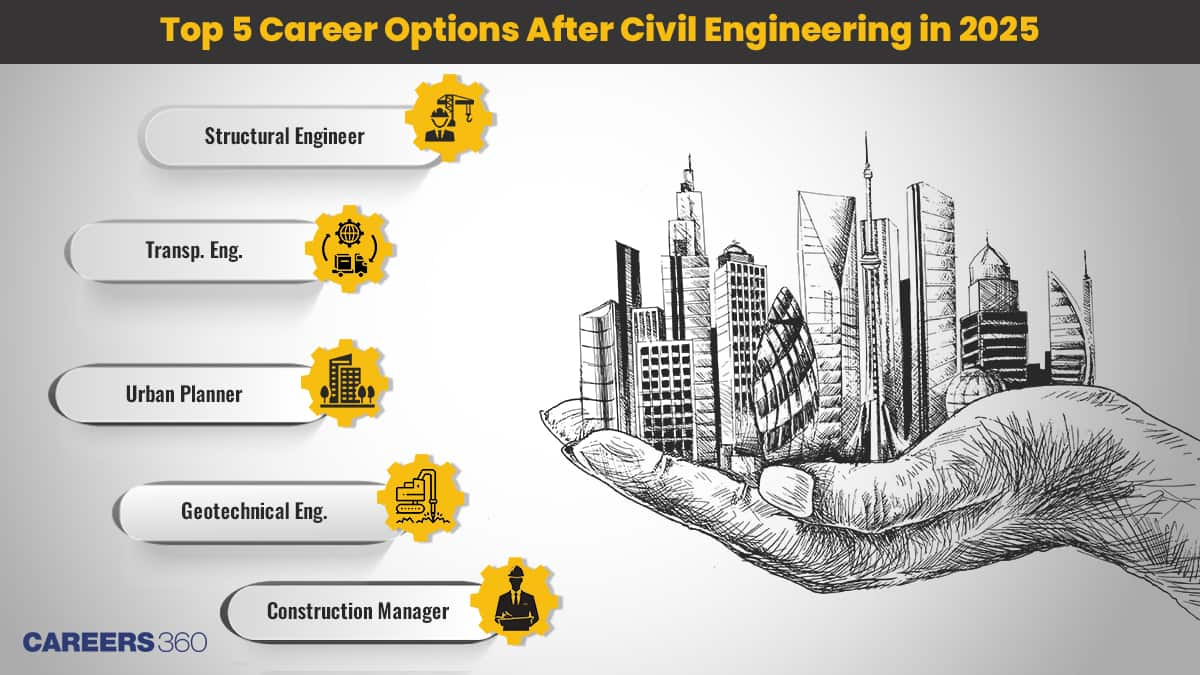Top 5 Career Options After Civil Engineering in 2025
Do you know that India is home to 8,876 engineering colleges, providing numerous courses for aspiring engineers? Among these disciplines, civil engineering is one of the most sought-after streams, attracting students interested in designing, constructing, and maintaining infrastructures.

If you are passionate about pursuing civil engineering, you might be wondering which is the best career option after a CE degree. This article can help you to make an informed decision as we explore the top five career options after a civil engineering course in India, along with eligibility requirements, salary and skills needed.
5 Best career options after Civil Engineering.
Numerous opportunities are awaiting candidates with a CE degree, ranging from traditional opportunities to advanced job roles. Below, we discuss five career options after Civil Engineering in 2025 that can offer you a successful and lucrative career.
1. Structural Engineer
A career as a Structural Engineer is one of the relevant job opportunities after civil engineering in India. They work on buildings, bridges, tunnels, and other infrastructure projects. If you are someone interested in designing and analysing the structural system of buildings, this job role can be a good option for you.
Skills required:
Construction Management
Project management
Software proficiency
Strong mathematical and technical skills
Average Annual Salary: Rs. 2.2 Lakhs - 12 Lakhs annually for 1 to 9 years of experience
(Salary Source: Ambitionbox)
2. Transportation Engineer
A well-designed road is the basis for traffic-free travelling. Transportation Engineers are primarily behind designing and building efficient transportation systems, including roads, railways, airports, and public transit networks. They are responsible for maintaining a safer and smoother transportation system for public and goods transportation. If you are looking for high-paying career options after civil engineering in India, transportation engineering is a good choice. To become a transportation engineer, you will need a civil engineering degree followed by a specialisation in transportation.
Skills required:
Road Design and Skills
Familiarity with software like Civil 3D
Public Transportation Planning and Safety Engineering
Annual Average Salary: Rs .2.2 Lakhs - 12 Lakhs annually for 1 to 11 years of experience
(Salary Source: Ambitionbox)
3. Urban Planner
We are all awed by the infrastructure marvel of Burj Khalifa, the Eiffel Tower. It represents the need for innovative infrastructure. Urban planning plays an important role in building highly efficient and modern infrastructure to ensure economic development and quality of life. Civil engineers with excellent skills and proficiency in infrastructure design and construction can pursue this field. A career as Urban planner is a top career option after Civil Engineering, which has great scope for the future. This profession leads you toward a secure and stable career.
Skills required:
Mastery in designing and building infrastructures
Focusing on sustainable development
Problem-solving skills and technical skills
Average salary Annually: Rs. 2.8 Lakhs - 14 lakhs annually for 1 to 10 years of experience
(Salary Source: Ambitionbox)
4. Geotechnical Engineer
A geotechnical engineer mainly works to ensure the safety of a construction project through the analysis of soil, rock and groundwater of the area. This is a field of engineering that offers the best career options after civil engineering, like Geotechnical Consultant, Foundation Engineer and Site Investigation Engineer. To become a Geotechnical Engineer, pursuing a civil engineering degree, followed by a specialisation in Geotechnical Engineering, is required.
Skills required:
The ability to assess risk and mitigation of consequences
Project management
Knowledge of geotechnical testing and analysis
Annual Salary on average: Rs. 2 Lakhs - 14 Lakhs annually for 10 years of experience
(Salary Source: Ambitionbox)
5. Construction Manager
An engineer who manages a construction project from its concept to completion can be called a Construction Manager. A career as a Construction Manager includes ensuring that the project is completed within the estimated time and is delivered with the promised quality.
Skills required:
Planning and Scheduling of Projects
Leadership qualities
Budget Management
Salary on an annual average basis: Rs. 7.2 Lakhs - 30 Lakhs annually for 6 to 15 years of experience
(Salary Source: Ambitionbox)
Conclusion
Pursuing civil engineering can be a great choice that you can make in 2025, as this profession offers an array of opportunities, varying from traditional career options after civil engineering to advanced career roles.
To achieve a position with an attractive salary and great future benefits, upskilling and being up to date with industry trends are highly recommended. Keep following your interests and continue with strong passion and determination to land a job of your dreams.
Frequently Asked Questions (FAQs)
The growth of new technologies and facilities have significantly increased the need for modern and more sustainable infrastructure worldwide. Recently emerging disciplines of engineering such as renewable energy or urban planning offers great opportunities and future benefits for an aspirant.
A civil Engineer needs a certain set of Skills to succeed and achieve a high paying position. Major skills required for a a civil engineer include,
Strong mathematical and technical skills
Ability to manage project,timelines and budget
Mastery in designing and building infrastructures
Designing roads and analysing traffic
A CE graduate can go for various government job opportunities like,
IES or India Engineering Services
PSU or Public sector undertakings
Defense Research and Development Organization (DRDO)
In government organizations like CPWD, Municipal Corporations, Public Health Engineering Department and National Thermal Power Corporation
A civil engineer in India with working experience ranging between 1 to 9 years can earn an average of 1.5 Lakh - 7.5 Lakhs on an annual basis.
(Salary Source: Ambitionbox)
A Civil engineer in India can work in various fields like,
Urban planner
Construction Project Manager
Geotechnical Engineer
Structural engineer
Transportation Engineer